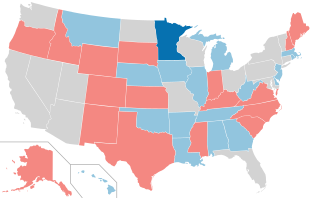Related Research Articles

Ben Nighthorse Campbell is an American politician who represented Colorado's 3rd congressional district in the United States House of Representatives from 1987 to 1993 and was a United States Senator from Colorado from 1993 to 2005. He serves as one of 44 members of the Council of Chiefs of the Northern Cheyenne Indian Tribe. During his time in office,he was the only Native American serving in Congress. He was the last Native American elected to the U.S. Senate until the 2022 election of Cherokee Markwayne Mullin.

Henry John Heinz III was an American businessman and politician who served as a United States senator from Pennsylvania from 1977 until his death in 1991. An heir to the Heinz family fortune,Heinz entered politics in 1971 when he won a special election to replace Robert Corbett to represent Pennsylvania's 18th congressional district. In 1976,Heinz ran to replace retiring Senate Minority Leader Hugh Scott. Heinz narrowly won in the Republican primary over future Senator Arlen Specter,and defeated William Green III in the general election. Heinz won re-election in 1982 and 1988 by large margins. On April 4,1991,Heinz was killed when his plane,facing mechanical problems,collided with a helicopter inspecting the plane,killing all involved in the crash.

John Hardy Isakson was an American businessman and politician who served as a United States senator from Georgia from 2005 to 2019. A member of the Republican Party,he previously served in the Georgia legislature and the United States House of Representatives.

The 1996 United States Senate elections were held on November 5,1996,with the 33 seats of Class 2 contested in regular elections. Special elections were also held to fill vacancies. They coincided with the presidential election of the same year,in which Democrat Bill Clinton was re-elected president.

The 1990 United States Senate elections were held on Tuesday,November 6,1990,with the 33 seats of Class 2 contested in regular elections. Special elections were also held to fill vacancies. The Democratic Party increased its majority with a net gain of one seat from the Republican Party. The election cycle took place in the middle of President George H. W. Bush's term,and as with most other midterm elections,the party not holding the presidency gained seats in Congress. This was the first time since 1980 that any party successfully defended all their own seats,and the first time Democrats did so since 1958.

The 1986 United States Senate elections were elections for the United States Senate. Held on November 4,in the middle of Ronald Reagan's second presidential term,the 34 seats of Class 3 were contested in regular elections. The Republicans had to defend an unusually large number of freshman Senate incumbents who had been elected on President Ronald Reagan's coattails in 1980. Democrats won a net of eight seats,defeating seven freshman incumbents,picking up two Republican-held open seats,and regaining control of the Senate for the first time since January 1981. This remains the most recent midterm election cycle in which the sitting president's party suffered net losses while still flipping a Senate seat.

The 1984 United States Senate elections were held on November 6,with the 33 seats of Class 2 contested in regular elections. They coincided with the landslide re-election of President Ronald Reagan in the presidential election. In spite of the lopsided presidential race,Reagan's Republican Party suffered a net loss of two Senate seats to the Democrats,although it retained control of the Senate with a reduced 53–47 majority.

The 1980 United States Senate elections were held on November 4,coinciding with Ronald Reagan's victory in the presidential election. The 34 Senate seats of Class 3 were contested in regular elections. Reagan's large margin of victory over incumbent Jimmy Carter gave a huge boost to Republican Senate candidates,allowing them to flip 12 Democratic seats and win control of the chamber for the first time since the end of the 83rd Congress in January 1955. This was the first time since 1966 that any party successfully defended all their own seats.

The 1974 United States Senate elections were held on November 5,with the 34 seats of Class 3 contested in regular elections. They occurred in the wake of the Watergate scandal,Richard M. Nixon's resignation from the presidency,and Gerald Ford's subsequent pardon of Nixon. Economic issues,specifically inflation and stagnation,were also a factor that contributed to Republican losses. As an immediate result of the November 1974 elections,Democrats made a net gain of three seats from the Republicans,as they defeated Republican incumbents in Colorado and Kentucky and picked up open seats in Florida and Vermont,while Republicans won the open seat in Nevada. Following the elections,at the beginning of the 94th U.S. Congress,the Democratic caucus controlled 60 seats,and the Republican caucus controlled 38 seats.

The 1968 United States Senate elections were elections for the United States Senate. Held on November 5,the 34 seats of Class 3 were contested in regular elections. They coincided with the presidential election of the same year. The Republicans picked up five net seats in the Senate. This saw Republicans win a Senate seat in Florida for the first time since Reconstruction.

The 1966 United States Senate elections were elections on November 8,1966,for the United States Senate which occurred midway through the second term of President Lyndon B. Johnson. The 33 seats of Class 2 were contested in regular elections. Special elections were also held to fill vacancies. With divisions in the Democratic base over the Vietnam War,and with the traditional mid-term advantage of the party not holding the presidency,the Republicans took three Democratic seats,thereby breaking Democrats' 2/3rds supermajority. Despite Republican gains,the balance remained overwhelmingly in favor of the Democrats,who retained a 64–36 majority. Democrats were further reduced to 63–37,following the death of Robert F. Kennedy in June 1968.

Charles A. Wilson Jr. was an American businessman and politician who served as a U.S. Representative for Ohio's 6th congressional district. A member of the Democratic Party,he previously served in the Ohio State Senate and the Ohio House of Representatives.

The 1912–13 United States Senate elections were held on various dates in various states. They were the last U.S. Senate elections before the ratification of the Seventeenth Amendment in 1913,establishing direct elections for all Senate seats. Senators had been primarily chosen by state legislatures. Senators were elected over a wide range of time throughout 1912 and 1913,and a seat may have been filled months late or remained vacant due to legislative deadlock. Some states elected their senators directly even before passage of Seventeenth Amendment. Oregon pioneered direct election and experimented with different measures over several years until it succeeded in 1907. Soon after,Nebraska followed suit and laid the foundation for other states to adopt measures reflecting the people's will. By 1912,as many as 29 states elected senators either as nominees of their party's primary or in conjunction with a general election.

Kent Douglas Lambert is a former legislator in the U.S. state of Colorado. A United States Air Force veteran,Lambert was elected to the Colorado General Assembly as a Republican in 2006. Most recently,he represented Senate District 9,which encompasses northwest Colorado Springs,the United States Air Force Academy,Monument and Black Forest.
Larry Jent is a politician and a former Democratic member of the Montana Legislature. He served in the Montana House of Representatives from 2001 to 2007,and served in the Montana Senate from 2007 to 2015.

The 2012 United States elections took place on November 6,2012. Democratic President Barack Obama won reelection to a second term and the Democrats gained seats in both chambers of Congress,retaining control of the Senate even though the Republican Party retained control of the House of Representatives. As of 2024,this is the most recent election cycle in which neither the presidency nor a chamber of Congress changed partisan control,and the last time that the party that won the presidency simultaneously gained seats in both the House of Representatives and the Senate.

The 1980 Oregon United States Senate election was held on November 4,1980 to select the U.S. Senator from the state of Oregon. Republican candidate Bob Packwood was re-elected to a third term,defeating Democratic state senator Ted Kulongoski and Libertarian Tonie Nathan.

The 2016 United States elections were held on Tuesday,November 8,2016. Republican nominee Donald Trump defeated Democratic former Secretary of State Hillary Clinton in the presidential election,while Republicans retained control of Congress. This marked the first time Republicans won or held unified control of the presidency and Congress since 2004,and would not do so again until 2024.

Ryan William Weld is a Republican member of the West Virginia Senate for the 1st district. He previously served in the West Virginia House of Delegates. He was appointed whip in 2017.

The 2020 United States House of Representatives elections in Colorado were held on November 3,2020,to elect the seven U.S. representatives from the state of Colorado,one from each of the state's seven congressional districts. The elections coincided with the 2020 U.S. presidential election,as well as other elections to the House of Representatives,elections to the United States Senate and various state and local elections.
References
- 1 2 Polaris (PDF). Vol. 22. Colorado Springs, Colorado: United States Air Force Academy. 1980. p. 344. Retrieved November 21, 2020.
- 1 2 "Charlie Ringo's Biography". Project VoteSmart. Retrieved March 25, 2017.
- ↑ "OR State House 06 2000". Our Campaigns. Retrieved March 25, 2017.
- ↑ "OR State Senate 17 2002". Our Campaigns. Retrieved March 25, 2017.
- ↑ "Breaking News: Charlie Ringo is Out". BlueOregon. January 18, 2006. Retrieved March 25, 2017.